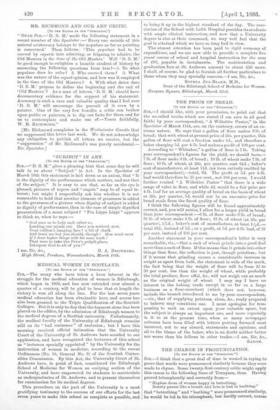THE PRICE OF BREAD.
[To THE EDITOR OF THE " SPECTATOR:9 SIR,—I should like, with your permission, to point out that the so-called truths which are stated (I am sure in all good faith) by your correspondent, "A Wiltshire Pastor," in the Spectator of March 11th, are, on the contrary, errors of an ex- treme nature. He says that a gallon of flour makes 8 lb. of bread; that with wheat at present price of 26s. per quarter, this gallon of flour will coat a fraction under 5d., and therefore a baker charging 5d. per 4.1b. loaf makes a profit of 100 per cent.
According to "Whitaker," a gallon of flour is 7 lb. Taking your correspondent's figures for the yield, we should have,- 7 lb. of flour make 8 lb. of bread ; 10 lb. of wheat make 7 lb. of flour ; 10 lb. of wheat, at 26s. per quarter, cost flicl. ; baker's cost of manufacture, at least lid. (an item entirely omitted by your correspondent),—total, 8d. The profit at 5d. per 4-1b. loaf would therefore be 25 per cent., not 100 per cent. I would further remind "A Wiltshire Pastor" that there is a wide range of value in flour, and while 4d. would be a fair price per 4-1b. loaf for an average quality of bread on the basis of wheat at 26s. per quarter, 5d. would not be an excessive price for bread made from the finest quality of flour.
I think the following figures will be found approximately correct, and, you will notice, I allow for a larger yield in bread than your correspondent :-6 lb. of flour make 8 lb. of bread ; 8i. lb. of wheat make 6 lb. of flour; 8f lb. of wheat (at 26s. per quarter), 5d.; baker's cost of manufacture, at least total 6d., instead of 5d,; or a profit, at 5d. per 4.1b. loaf, of 37 per cent, instead of 100 per cent.
Another statement in your correspondent's letter is very remarkable, viz.,—that a sack of wheat grinds into a good deal more than a sack of flour. If this means that it grinds into other things than flour, the reflection is just, though pointless ; but if it means that grinding causes a considerable increase in weight as apart from bulk, the statement is wide of the mark, the fact being that the weight of flour will be from 25 to 30 per cent. less than the weight of wheat, while probably the total produce, flour offal, &a., will not weigh out as much as the original weight of wheat. I may say I have no interest in the baking trade except in so far as a large business as a flour-merchant (which does not, however, include the branch introduced to me by your correspondent, —viz., that of supplying potatoes, alum, &c., ready prepared to bakers) may constitute one. I must apologise for tres- passing to such an extent upon your valuable space, but the subject is always an important one, and more especially is it so at the present time, when so many newspaper columns have been filled with letters putting forward most incorrect, not to say absurd, statements and opinions, and all to the blame of the baker, who is no doubt neither better nor worse than his fellows in other trades.—I am, Sir, &c., SAXON.


































 Previous page
Previous page